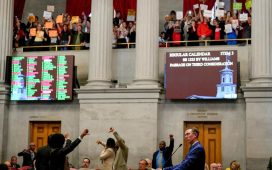The racing industry had a number of hurdles ahead of it before the COVID-19 pandemic hit. Reducing fatal breakdowns, creating a national regulatory body, attracting new owners and horseplayers, along with many other challenges, were all at the forefront of discussions before March 2020. Speaking at this week’s American Horse Council National Issues Forum, industry experts say 2020 may have worsened the next big problem facing racing — the labor shortage.
In the short term, the pandemic made it difficult for people to travel to work in the United States on a short-term basis, but that problem may have been solved. Earlier this year, President Trump issued three proclamations that suspended the entry of aliens from certain countries due to concerns about the novel coronavirus. Several groups, including Breeders’ Cup, the National Thoroughbred Racing Association, Keeneland, Kentucky Thoroughbred Association, and Fasig-Tipton, worked with the Department of Homeland Security to get exemptions for people traveling into the United States to buy horses at the autumn sales or to run at the Breeders’ Cup. The president’s restrictions allowed for exemptions that were in “the national interest” and through a very specific and detailed explanation of Thoroughbred economics, the industry groups were able to get exemptions for certain key players in both events. That discussion could ultimately prove helpful down the road.
“We were happy we were able to get that done,” said NTRA President and CEO Alex Waldrop. “I think it’s a good story to tell. At this point in time, I think the Department of Homeland Security is very familiar with our industry, the international nature of our industry, and they’re supportive of the national interest exemption where it’s appropriate.”
That doesn’t mean that when the pandemic is over, the horse racing industry will no longer face restrictions on international movement that impact its bottom line. It’s no secret that trainers and farms have had difficulty in recent years accessing H-2A and H-2B visa workers to fill seasonal needs for grooms, hotwalkers, exercise riders, and farm workers. Those restrictions have only gotten tighter under the current administration, according to the Bryan Brendle, director of policy and legislative affairs for the American Horse Council.
The Department of Homeland Security has discretion to allow visas above the statutory cap, and while it did authorize supplemental H-2B visas in March, it only released 35,000 and not the 60,000 it could have released. (Trainers have previously said even with supplemental visas released they struggled to find staff.)
The issuance of new H-2B visas was put on hold in June. In August, the U.S. State Department, which handles the visa process in the home countries of guest workers, did create an exemption for caretakers of non-farm animals, which is how horses are classified in the visa system. That only freed up people who had been granted visas prior to the freeze and then been told not to travel to the United States, so the State Department’s action didn’t result in many additional workers coming into the States.
Eric Hamelback, CEO of the National HBPA, said he still regularly hears from trainers, including high-profile operations like Chad Brown, Todd Pletcher, and Dale Romans, who are unable to find enough help despite high unemployment figures in the States this year. Hamelback said he knew of operations at smaller tracks that had to close altogether because they couldn’t find employees to take care of horses.
“While we are all on different pages with some items in this industry we can’t be on different pages as we push for our workforce shortages, whether it’s developing new programs here in the States or continuing to push for H-2B visas,” said Hamelback.
Waldrop said the “elephant in the room” is the potential impact of the upcoming national election on this issue.
“You have to ask yourself — is there a difference between a Trump presidency and a Biden presidency?” he said. “My sense is, we’ve got an uphill battle, we’ve got tough sledding if we continue to work with the Trump administration. I think you’re going to see difficult times ahead, certainly no talk of comprehensive immigration reform.
“I think you cannot say Trump will not develop a comprehensive policy and Biden will, but I do think you’ll see some additional conversation taking place [if Biden wins].”
Of course, one solution would be to try to create a better pipeline for domestic workers to fill the jobs on the racetrack. Remi Bellocq, executive director of Equine Programs at Bluegrass Community and Technical College, said that progress could be on the horizon on this issue, but it’s not going to be an easy one to solve. Bellocq recently collaborated with the Kentucky Chamber of Commerce and KEEP to create a one-year apprenticeship program for horse trainers. He also suggested Godolphin may soon launch an international educational initiative to help those interested in racing find the appropriate pathway to industry jobs in their country.
“On a greater scale, we need to look at what we do nationally,” Bellocq said. “My strong feeling is that until we approach the workforce issue the same way we approach unwanted horses or racing medication, this will continue to be a bigger and bigger challenge. One of the things I’ve found personally is you have a guest worker immigration issue you have to deal with, but the labor issue, which is a domestic training issue, is just as critical. Until we can incentivize and recruit domestic workers into our industry, pay them what they ought to be paid, find work/life balance, it’s going to be a growing problem.
“What I find with a lot of our graduates is they’ll go to work for a trainer but very quickly they’ll want to move up, become an assistant trainer or a foreman, and we have to very quickly fill those lower skilled jobs again. That’s one of the things we continue to try to find solutions for.”
New to the Paulick Report? Click here to sign up for our daily email newsletter to keep up on this and other stories happening in the Thoroughbred industry.
Copyright © 2020 Paulick Report.







